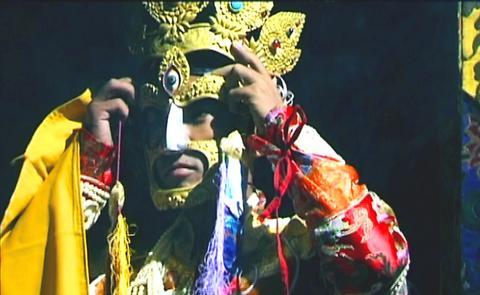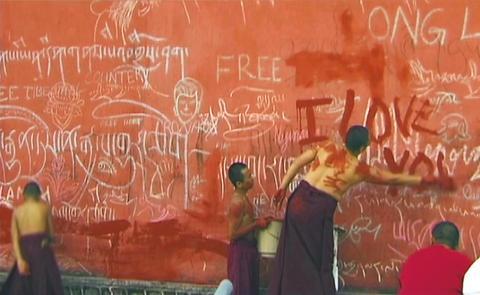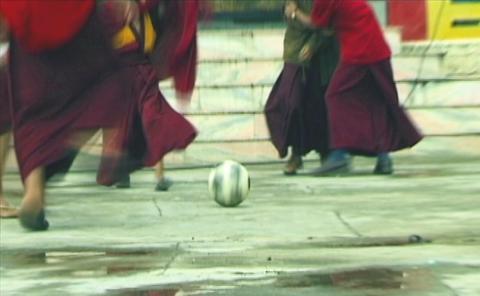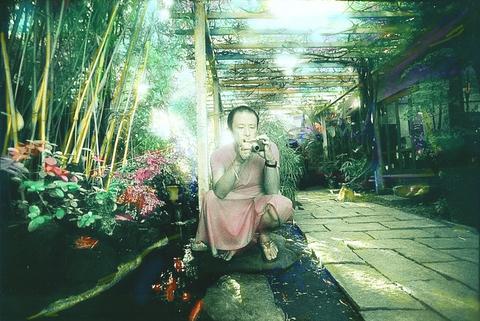Why does one go to the cinema? For some, it is to escape the reality of life. For Anika Tokarchuk, cinema is the reality of her life. For the past six years, her existence has revolved around the shifting images, sounds, and characters on the screen. Recently, the Canadian filmmaker who is now living in Taipei debuted her documentary, Life as Cinema, on Public Television Service (PTS,
What started off in 1998 as a documentary on the making of The Cup by Dzongsar Khyentse Rinpoche led Tokarchuk on a journey from Canada through Europe, India and finally to Taiwan. Her project has turned into a three-part series, drawing on support from respected members of the Taiwanese film industry and various buddhist organizations.
"This documentary started off as Rinpoche's idea," Tokarchuk said. "Of course, I really was excited about it, but I had no idea how incredible and how wild the adventure would be. I've lived through this whole amazing experience while making this film, and by doing so I think it has molded the character of the film."

PHOTO COURTESY OF ANIKA TOKARCHUK,IMAGE LANTERN PICTURES LTD
At first, the road was smooth. With a conditional approval for funding through the Canadian film and television industry, Tokarchuk left to begin shooting in India. Six months later, however, on the same day she received permission to interview the Dalai Lama, the offer for funding was unexpectedly withdrawn. Having explored all avenues for financial support before leaving Canada, Tokarchuk felt returning was not an option. To make things worse, she had only US$200 remaining and no return flight.
"It really felt like a dead end to go back. And plus I had my film 80 percent made, it's kind of like if you are seven months pregnant you can't have an abortion, you have to go through with it," she said.
Contemplating her next move, Tokarchuk remained in Dharamshala, where she met a number of individuals teaching English in north-east Asia. Taiwan, a prosperous English teaching market and a country with a growing relationship with Tibet -- both in funding and number of dharma students -- seemed to offer the best environment for Anika's film.

PHOTO COURTESY OF ANIKA TOKARCHUK,IMAGE LANTERN PICTURES LTD
A coincidental meeting with the well-known Taiwanese director, Stan Lai (
Two years went by and Tokarchuk took up residence in Taiwan as an English teacher. After earning enough money to furbish her own home film studio, she was ready to begin the arduous job of editing. An increasingly visible future slowly emerged through a web of connections, one of which is Hung Hung (
Associate director of Life as Cinema, Hung encouraged

PHOTO COURTESY OF ANIKA TOKARCHUK,IMAGE LANTERN PICTURES LTD
Tokarchuk to "go wild" with the 200-hours of footage. "It is much more than a film to her," said Hung, "It is a journey of discovery and the Buddhist dharma that she was practicing through the making of this film. She needed to continue, to finish the project."
Hung said that, to some people, the film might be too experimental in its approach. "Some films need to be seen twice to be understood," he said, implying it's not easy to digest a real meal after being fed junk food for so long.
Sylvia Feng (

PHOTO COURTESY OF ANIKA TOKARCHUK,IMAGE LANTERN PICTURES LTD
One scene in the documentary covers a discussion held at the famed Wisteria Tea House in Taipei. Feng said, "No Taiwanese photographer could capture the aura of Wisteria Tea House [a popular meeting place for"intellectuals'] better than Anika [Tokarchuk] ... her visualization of the intellectual culture in Taipei may spark enlightenment for Taiwanese directors."
The appreciation of Tokarchuk's film, however, goes beyond just artistic or intellectual circles. The Hao Ran Foundation (
Another supporter, Su-Jei Own (

PHOTO COURTESY OF ANIKA TOKARCHUK, IMAGE LANTERN PICTURES LTD
Tokarchuk's experience of making the film changed her perceptions, as she thought they would. "The experience that I've gone through has been my version of living through the themes in Life as Cinema. It really has been this experience of living in this amazing reality."

In the March 9 edition of the Taipei Times a piece by Ninon Godefroy ran with the headine “The quiet, gentle rhythm of Taiwan.” It started with the line “Taiwan is a small, humble place. There is no Eiffel Tower, no pyramids — no singular attraction that draws the world’s attention.” I laughed out loud at that. This was out of no disrespect for the author or the piece, which made some interesting analogies and good points about how both Din Tai Fung’s and Taiwan Semiconductor Manufacturing Co’s (TSMC, 台積電) meticulous attention to detail and quality are not quite up to

April 21 to April 27 Hsieh Er’s (謝娥) political fortunes were rising fast after she got out of jail and joined the Chinese Nationalist Party (KMT) in December 1945. Not only did she hold key positions in various committees, she was elected the only woman on the Taipei City Council and headed to Nanjing in 1946 as the sole Taiwanese female representative to the National Constituent Assembly. With the support of first lady Soong May-ling (宋美齡), she started the Taipei Women’s Association and Taiwan Provincial Women’s Association, where she

Chinese Nationalist Party (KMT) Chairman Eric Chu (朱立倫) hatched a bold plan to charge forward and seize the initiative when he held a protest in front of the Taipei City Prosecutors’ Office. Though risky, because illegal, its success would help tackle at least six problems facing both himself and the KMT. What he did not see coming was Taipei Mayor Chiang Wan-an (將萬安) tripping him up out of the gate. In spite of Chu being the most consequential and successful KMT chairman since the early 2010s — arguably saving the party from financial ruin and restoring its electoral viability —

It is one of the more remarkable facts of Taiwan history that it was never occupied or claimed by any of the numerous kingdoms of southern China — Han or otherwise — that lay just across the water from it. None of their brilliant ministers ever discovered that Taiwan was a “core interest” of the state whose annexation was “inevitable.” As Paul Kua notes in an excellent monograph laying out how the Portuguese gave Taiwan the name “Formosa,” the first Europeans to express an interest in occupying Taiwan were the Spanish. Tonio Andrade in his seminal work, How Taiwan Became Chinese,